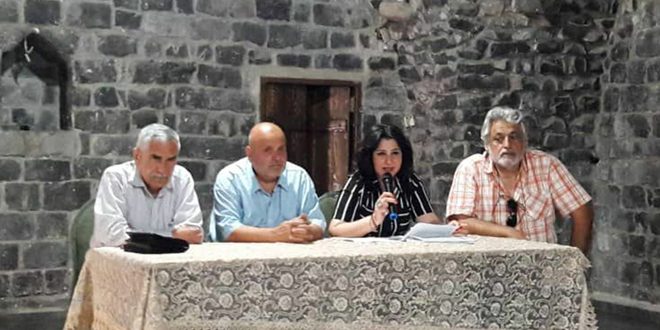 The second day of cultural and theatrical days organized by the Ornina Cultural Forum highlighted Farhan Bulbul’s career as a writer, and theatre director.
The second day of cultural and theatrical days organized by the Ornina Cultural Forum highlighted Farhan Bulbul’s career as a writer, and theatre director.
The Al-Arbaeen Church of al-Hamidiya neighborhood in the old Homs hosted a symposium, attended by Bulbul and a crowd of followers and interested in the theatre, on his artistic career, his most important plays, and his pioneering role from an early age in creating the theatre and his contribution to the Syrian and Arab theatre movement since its beginning.
The writer Dr. Rasha Dr. Al-Ali reviewed a number of plays by Bulbul, the fanfare and widespread controversy they caused in society and his creation of the Workers’ Theatre Band, which had a clear mark on Syrian society in general and particularly Homs.
She talked about the chapters of Bulbul’s book, “Theatre and Death Story,” which recounted his autobiography and its most important time stations and the continuity of giving over 40 years. It reflected his relationship with the theatre and his attempt to recover events from his autobiography in parallel to his theatrical biography.
Al-Ali explained that Bulbul wrote his biography because it was more self-adhesive and because he wanted to search for a theatrical identity that is still going on and to confirm his humanitarian and theatrical presence in the face of conflict and transformations in society. She pointed out that the biography was written artistically according to chapters entitled “The stream, the river, the lake, and the writer’s ink” as if it were a novel.
Al-Ali asserted that the study of the pioneers’ biographies is a real addition to the Arab theater because it is a witness to the stages of the theater development and thus drawing up the features of the Arab theatrical movement.
The writer and researcher Attiya Masouh pointed out that Bulbul practices culture in reading, meditation, reflection, and representation and aimed to engage imagination with the readable text and incite creative ideas. “Besides mastering the art of theatre, he was not far from other literary genres of criticism, poetry, and heritage,” He added.
Masouh said,” the most prominent features of the Bulbul Theatre are the utilization of theatrical schools without being a copycat or captive of certain schools, as well as his realism which is away from artistic naivety and addressing phased issues as vocabulary for issues associated with the universe and human existence.”
Masouh noted the importance of the new revival project initiated by Bulbul with the publication of the book “The Message of Forgiveness,” where the essence of the project lies in the presentation of some timeless heritage books in a modern manner and in a smooth language as reading them was exclusively to the elite specialists in Arabic language.
Amal Farhat

